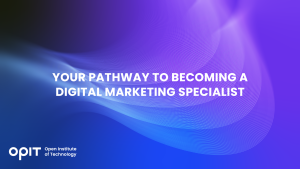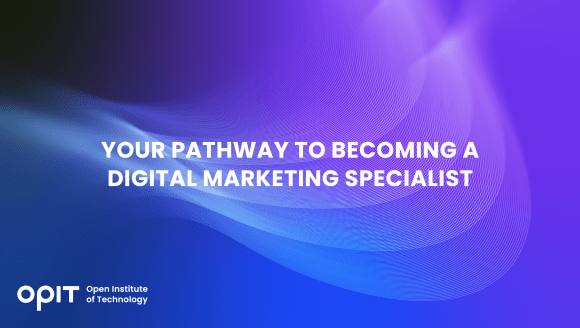

If you’re eyeing the digital marketing scene, know that every click tells a story, and every strategy can turn the tables for companies fighting for the online spotlight. Creativity meets metrics, and social media is a place to make connections that matter and spread the word about your brand or make it so that the word spreads on its own. Here is how to become a digital marketing specialist.
Understanding the Role of a Digital Marketing Specialist
Imagine being the person for everything online in a business. That’s more or less what a digital marketing specialist does.
They handle everything from making a website appear at the top of search results (thanks to SEO) to crafting the kind of content that makes people click, share, and buy. Specialists know what makes audiences tick on social media and keep up with the latest hashtag trends to figure out the best time to post. They don’t throw content out into the void and hope for the best—they analyze everything.
Which tweet has the most engagement? Did changing the call-to-action on that email campaign increase conversions? It’s all in a day’s work.
But what’s the big deal about all this, you might ask.
Being visible online is pretty much everything for a business these days. It matters little if it’s a local bakery or a multinational tech company. They all need to be online so potential customers can find them. Their digital marketing specialist uses a mix of creativity, analytics, and tech-savvy to boost brand awareness, rake in leads, and ultimately, drive sales. These specialists are the ones making sure a business is actively connecting with people and turning them into customers.
Essential Skills and Qualifications
To become a digital marketing specialist, you must have strong technical skills, creativity, and a fair bit of analytical prowess. Here’s a rundown:
- SEO/SEM reveals the alchemy of search engines that can make or break a brand’s online visibility. This skill helps you know the right keywords, the magic of backlinks, and the techniques of ranking higher.
- Content creation (blogs that tell a story, videos that captivate, or tweets that go viral) must resonate with your audience.
- Data analysis is great if you love numbers because dissecting website traffic, engagement rates, and conversion stats to understand what’s working (and what’s not) is a big part of the game.
- Social media expertise means knowing your TikToks from your Tweets. Each platform operates on a distinct system, and mastering these can help you connect with audiences effectively.
- PPC advertising is just as significant. Crafting the ads at the top of the search results requires a keen understanding of PPC strategies, especially if you’re aiming for a monetary balance.
As for the educational backdrop, while you don’t necessarily need a degree in digital marketing, having one in related fields like marketing, communications, or business can give you a solid foundation. That said, digital marketing values skills and real-world experience just as much, if not more.
Path to Becoming a Digital Marketing Specialist
Here’s a guide on how to be a digital marketing specialist:
1. Obtain a Relevant Degree
While you don’t need a degree in marketing to break into digital marketing, it undoubtedly helps. A bachelor’s in marketing, communications, or a related field lays a solid foundation. It introduces you to marketing principles, consumer behavior, and, increasingly, digital marketing basics. If college isn’t your path, there are still many success stories from self-taught specialists.
2. Get Hands-on Experience
There’s no substitute for getting directly involved in digital marketing. Internships are a great step, as they give you a peek into the industry’s workings and let you apply what you’ve learned. Or you can start your own project. Create a blog, manage social media for a family business, or run your own PPC campaigns to build a portfolio that showcases your skills.
3. Prioritize Continuous Learning
Digital marketing evolves fast, so you must keep up with the trends. Online courses and certifications can keep you up to date while also boosting your resume. Certifications like Google Ads, Facebook Blueprint, or SEMrush certifications also prove your skills and dedication to the craft. Each one is a step toward establishing your expertise.
4. Start Networking
Join digital marketing forums, attend webinars, and don’t be shy about reaching out to professionals you admire. The digital marketing community is surprisingly welcoming and a treasure trove of insights and opportunities.
5. Apply for Entry-Level Positions
With some education, a portfolio, and a few certifications under your belt, start applying for entry-level positions. Adjust your resume to highlight your digital marketing skills and projects, and don’t get discouraged by setbacks. Every interview, whether successful or not, is a point of learning.
OPIT’s Digital Marketing Education Programs
OPIT has a couple of solid programs up its sleeve for digital marketing—the BSc and MSc in Digital Business. They aren’t typical, dry lecture-based courses. These programs give you both the theory and practice necessary in digital marketing.
OPIT’s approach is unique in the way it blends theory with practice. You learn the latest trends, tools, and strategies currently being used in the industry. Plus, you’re not learning in a vacuum. OPIT connects you with industry experts, giving you a chance to pick the brains of people who have invaluable experience and skills. The programs offer first-hand insights, resources, and a network of professionals you’d be hard-pressed to find anywhere else.
Why Choose a Career as a Digital Marketing Specialist
For starters, every business out there, from the hole-in-the-wall coffee shop to giant corporations, is trying to make its mark online. That means there’s an enormous demand for people who can handle the digital world creatively and effectively.
This job also keeps you on your toes. One day, you might be cracking the code on a Google Ads campaign, and the next, you’re storytelling on Instagram or analyzing website traffic. It’s this mix of creativity, strategy, and analytics that makes the work diverse and, believe it or not, pretty exciting.
Become the Social Media Strategist You Were Meant to Be
The path to becoming a specialist is fairly varied, but two factors hold true: you need to keep on top of current trends, and you need hands-on experience. Fortunately, OPIT positions you on the right career path by providing just that. Check out OPIT’s bachelor’s and master’s programs in digital business and learn how to be a good digital marketing specialist first-hand.
Related posts

Source:
- EFMD Global, Published on July 12th, 2024.
By Stephanie Mullins
Many people love to read the stories of successful business school graduates to see what they’ve achieved using the lessons, insights and connections from the programmes they’ve studied. We speak to one alumnus, Riccardo Ocleppo, who studied at top business schools including London Business School (LBS) and INSEAD, about the education institution called OPIT which he created after business school.
Please introduce yourself and your career to date.
I am the founder of OPIT — Open Institute of Technology, a fully accredited Higher Education Institution (HEI) under the European Qualification Framework (EQF) by the MFHEA Authority. OPIT also partners with WES (World Education Services), a trusted non-profit providing verified education credential assessments (ECA) in the US and Canada for foreign degrees and certificates.
Prior to founding OPIT, I established Docsity, a global community boasting 15 million registered university students worldwide and partnerships with over 250 Universities and Business Schools. My academic background includes an MSc in Electronics from Politecnico di Torino and an MSc in Management from London Business School.
Why did you decide to create OPIT Open Institute of Technology?
Higher education has a profound impact on people’s futures. Through quality higher education, people can aspire to a better and more fulfilling future.
The mission behind OPIT is to democratise access to high-quality higher education in the fields that will be in high demand in the coming decades: Computer Science, Artificial Intelligence, Data Science, Cybersecurity, and Digital Innovation.
Since launching my first company in the education field, I’ve engaged with countless students, partnered with hundreds of universities, and collaborated with professors and companies. Through these interactions, I’ve observed a gap between traditional university curricula and the skills demanded by today’s job market, particularly in Computer Science and Technology.
I founded OPIT to bridge this gap by modernising education, making it affordable, and enhancing the digital learning experience. By collaborating with international professors and forging solid relationships with global companies, we are creating a dynamic online community and developing high-quality digital learning content. This approach ensures our students benefit from a flexible, cutting-edge, and stress-free learning environment.
Why do you think an education in tech is relevant in today’s business landscape?

As depicted by the World Economic Forum’s “Future of Jobs 2023” report, the demand for skilled tech professionals remains (and will remain) robust across industries, driven by the critical role of advanced technologies in business success.
Today’s companies require individuals who can innovate and execute complex solutions. A degree in fields like computer science, cybersecurity, data science, digital business or AI equips graduates with essential skills to thrive in this dynamic industry.
According to the International Monetary Fund (IMF), the global tech talent shortage will exceed 85 million workers by 2030. The Korn Ferry Institute warns that this gap could result in hundreds of billions in lost revenue across the US, Europe, and Asia.
To address this challenge, OPIT aims to democratise access to technology education. Our competency-based and applied approach, coupled with a flexible online learning experience, empowers students to progress at their own pace, demonstrating their skills as they advance.
Read the full article below:

Source:
- The European, Summer 2024 Edition, Page 24
With careful planning, ethical considerations, and ensuring human oversight is maintained, AI can have huge market research benefits, says Lorenzo Livi of the Open Institute of Technology.
By Lorenzo Livi
To market well, you need to get something interesting in front of those who are interested. That takes a lot of thinking, a lot of work, and a whole bunch of research. But what if the bulk of that thinking, work and research could be done for you? What would that mean for marketing as an industry, and market research specifically?
With the recent explosion of AI onto the world stage, big changes are coming in the marketing industry. But will AI be able to do market research as successfully? Simply, the answer is yes. A big, fat, resounding yes. In fact, AI has the potential to revolutionise market research.
Ensuring that people have a clear understanding of what exactly AI is is crucial, given its seismic effect on our world. Common questions that even occur amongst people at the forefront of marketing, such as, “Who invented AI?” or, “Where is the main AI system located?” highlight a widespread misunderstanding about the nature of AI.
As for the notion of a central “main thing” running AI, it’s essential to clarify that AI systems exist in various forms and locations. AI algorithms and models can run on individual computers, servers, or even specialized hardware designed for AI processing, commonly referred to as AI chips. These systems can be distributed across multiple locations, including data centres, cloud platforms, and edge devices. They can also be used anywhere, so long as you have a compatible device and an internet connection.
While the concept of AI may seem abstract or mysterious to some, it’s important to approach it with a clear understanding of its principles and applications. By promoting education and awareness about AI, we can dispel misconceptions and facilitate meaningful conversations about its role in society.
Read the full article below:
- The European, Pages 24 to 26.
Have questions?
Visit our FAQ page or get in touch with us!
Write us at +39 335 576 0263
Get in touch at hello@opit.com
Talk to one of our Study Advisors
We are international
We can speak in:


